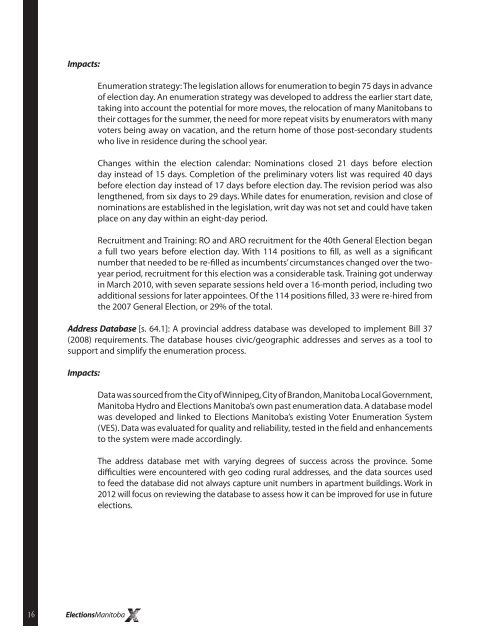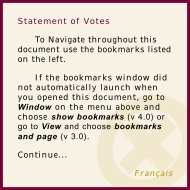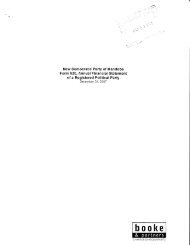Annual REPORT - Elections Manitoba
Annual REPORT - Elections Manitoba
Annual REPORT - Elections Manitoba
Create successful ePaper yourself
Turn your PDF publications into a flip-book with our unique Google optimized e-Paper software.
Impacts:<br />
Enumeration strategy: The legislation allows for enumeration to begin 75 days in advance<br />
of election day. An enumeration strategy was developed to address the earlier start date,<br />
taking into account the potential for more moves, the relocation of many <strong>Manitoba</strong>ns to<br />
their cottages for the summer, the need for more repeat visits by enumerators with many<br />
voters being away on vacation, and the return home of those post-secondary students<br />
who live in residence during the school year.<br />
Changes within the election calendar: Nominations closed 21 days before election<br />
day instead of 15 days. Completion of the preliminary voters list was required 40 days<br />
before election day instead of 17 days before election day. The revision period was also<br />
lengthened, from six days to 29 days. While dates for enumeration, revision and close of<br />
nominations are established in the legislation, writ day was not set and could have taken<br />
place on any day within an eight-day period.<br />
Recruitment and Training: RO and ARO recruitment for the 40th General Election began<br />
a full two years before election day. With 114 positions to fill, as well as a significant<br />
number that needed to be re-filled as incumbents’ circumstances changed over the twoyear<br />
period, recruitment for this election was a considerable task. Training got underway<br />
in March 2010, with seven separate sessions held over a 16-month period, including two<br />
additional sessions for later appointees. Of the 114 positions filled, 33 were re-hired from<br />
the 2007 General Election, or 29% of the total.<br />
Address Database [s. 64.1]: A provincial address database was developed to implement Bill 37<br />
(2008) requirements. The database houses civic/geographic addresses and serves as a tool to<br />
support and simplify the enumeration process.<br />
Impacts:<br />
Data was sourced from the City of Winnipeg, City of Brandon, <strong>Manitoba</strong> Local Government,<br />
<strong>Manitoba</strong> Hydro and <strong>Elections</strong> <strong>Manitoba</strong>’s own past enumeration data. A database model<br />
was developed and linked to <strong>Elections</strong> <strong>Manitoba</strong>’s existing Voter Enumeration System<br />
(VES). Data was evaluated for quality and reliability, tested in the field and enhancements<br />
to the system were made accordingly.<br />
The address database met with varying degrees of success across the province. Some<br />
difficulties were encountered with geo coding rural addresses, and the data sources used<br />
to feed the database did not always capture unit numbers in apartment buildings. Work in<br />
2012 will focus on reviewing the database to assess how it can be improved for use in future<br />
elections.<br />
16





